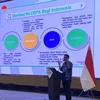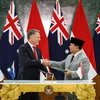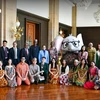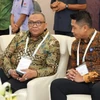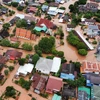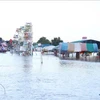Experts from the Council on Foreign Relations (CFR), an independent think tank in the US, have expressed their concerns over the escalating territorial disputes between China and its neighbours in the East Sea and the East China Sea.
The tensions, caused by China's growing assertiveness, have fueled concerns over armed conflict and raised questions about Washington's security commitments in its strategic rebalance toward the Asia-Pacific region, they said.
Maritime disputes in those seas are a pressing issue for the US , China , and much of the rest of the world, said Elizabeth Economy, CFR's Director for Asia Studies. The region is rich in natural resources, home to many of the world's most dynamic economies, and an important global trade route for energy supplies and other goods.
According to US scholars, as China's economic ascent facilitates growing military capabilities and assertiveness in both the East Sea and the East China Sea, other regional players are also experiencing their own rise in nationalism and military capability, and have exhibited greater willingness to stake territorial claims.
Meanwhile, the US "pivot" to Asia, involving renewed diplomatic activity and military redeployment, could signal Washington 's heightened role in the disputes.
If not managed wisely, these disputes could turn part of Asia 's maritime regions from thriving trade channels into arenas of conflict, said Sheila A. Smith, CFR's Senior Fellow for Japan Studies. "If there is a use of force between Japan and China , this could be a full-on, all-out conflict between these two Asian giants, and as a treaty ally of Japan , will automatically trigger or automatically involve the United States ," she added.
These dynamics pose an "exquisite" dilemma for US foreign policy, said CFR President Richard N. Haass. "The danger is that twenty-first-century Asia could begin to go the way of twentieth-century Europe ."
Founded in 1921, the CFR is an independent, nonpartisan membership organisation, think tank, and publisher dedicated to being a resource for its members , government officials, business executives , journalists , educators and students, civic and religious leaders , and other interested citizens in order to help them better understand the world and the foreign policy choices facing the US and other countries.-VNA
The tensions, caused by China's growing assertiveness, have fueled concerns over armed conflict and raised questions about Washington's security commitments in its strategic rebalance toward the Asia-Pacific region, they said.
Maritime disputes in those seas are a pressing issue for the US , China , and much of the rest of the world, said Elizabeth Economy, CFR's Director for Asia Studies. The region is rich in natural resources, home to many of the world's most dynamic economies, and an important global trade route for energy supplies and other goods.
According to US scholars, as China's economic ascent facilitates growing military capabilities and assertiveness in both the East Sea and the East China Sea, other regional players are also experiencing their own rise in nationalism and military capability, and have exhibited greater willingness to stake territorial claims.
Meanwhile, the US "pivot" to Asia, involving renewed diplomatic activity and military redeployment, could signal Washington 's heightened role in the disputes.
If not managed wisely, these disputes could turn part of Asia 's maritime regions from thriving trade channels into arenas of conflict, said Sheila A. Smith, CFR's Senior Fellow for Japan Studies. "If there is a use of force between Japan and China , this could be a full-on, all-out conflict between these two Asian giants, and as a treaty ally of Japan , will automatically trigger or automatically involve the United States ," she added.
These dynamics pose an "exquisite" dilemma for US foreign policy, said CFR President Richard N. Haass. "The danger is that twenty-first-century Asia could begin to go the way of twentieth-century Europe ."
Founded in 1921, the CFR is an independent, nonpartisan membership organisation, think tank, and publisher dedicated to being a resource for its members , government officials, business executives , journalists , educators and students, civic and religious leaders , and other interested citizens in order to help them better understand the world and the foreign policy choices facing the US and other countries.-VNA






